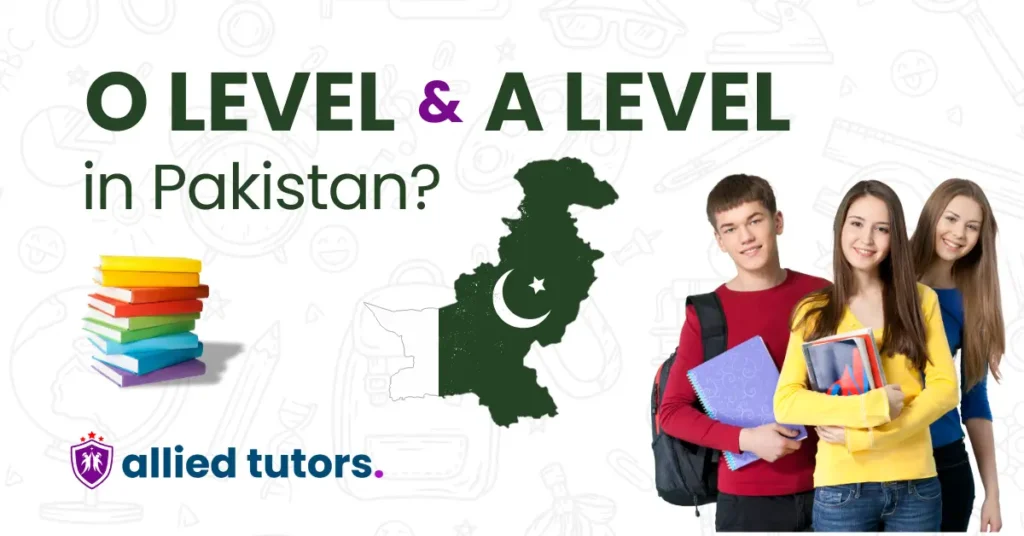Education shapes the future of students by giving them the skills and knowledge they need to succeed. In Pakistan, many schools follow the Cambridge International Education system, which includes O Level and A Level qualifications. These programs offer a modern learning experience and are highly valued by both local and international universities.
O Level is seen as an excellent foundation for higher education, not just in Pakistan but also abroad. Many students use these qualifications as a stepping stone to prestigious universities worldwide, helping them build successful academic and professional careers.
The O Level system focuses on conceptual learning and skill development, which prepares students for future challenges. With its broad subject choices and global recognition, this education system offers students more flexibility and better opportunities compared to traditional Matriculation.
1. What is O Level in Pakistan?
The O Level (Ordinary Level) is an internationally recognized qualification provided by Cambridge Assessment International Education (CAIE). It offers students a modern and well-rounded alternative to Pakistan’s Matriculation system.
Designed for students aged 14 to 16, the O Level program typically takes 2 to 3 yearsto complete. Its globally accepted curriculum helps students build a strong foundation, making it easier for them to pursue higher education both in Pakistan and internationally. Many students opt for O Level because it offers better academic flexibility and global opportunities compared to traditional local systems.
Subjects Offered in O Level:
One of the key benefits of the O Level program is the flexibilityit provides. Students have the opportunity to choose subjects that align with their interests and future career aspirations. These subjects are grouped into categories, offering multiple pathways for students, such as Science, Commerce, or Humanities.
O Level Subjects by Group
| Science Group | Commerce Group | Humanities Group |
| Physics | Principles of Accounts | Sociology |
| Chemistry | Business Studies | Psychology |
| Biology / Computer Studies | Economics | History |
| Additional Mathematics | Mathematics | Geography |
| Environmental Management | Accounting | Literature |
Compulsory Subjects for All Groups
| Subject | Details |
| English Language | Focus on reading, writing, and comprehension. |
| Urdu | National language – essential for O Level. |
| Islamiyat / Religious Studies | Covers Islamic teachings or other religions. |
| Pakistan Studies | History and geography of Pakistan. |
| Mathematics (Core/Extended) | Mandatory for most students. |
The O Level curriculum emphasizes critical thinking, problem-solving, and in-depth understanding of each subject. Unlike traditional systems focused on rote learning, this program encourages students to analyze concepts and apply their knowledge in real-world scenarios.
Students are expected to develop strong analytical skillsand explore topics beyond the basics provided in textbooks. Through project work, research assignments, and practical assessments, they gain a deeper understanding of their subjects, preparing them for A Level studies and higher education.
This well-rounded approach ensures students are not only well-prepared academically but also confident, independent learners ready to face future challenges.
Why Choose O Level?

O Level education is a preferred choice for many students and parents in Pakistan due to its global recognition, focus on skill-building, and career-enhancing opportunities. Let’s dive into the key reasons why O Level stands out compared to the traditional Matriculation system:
1. Globally Recognized Qualification
The O Level certificate is accepted by top universities and employers around the world, including in the UK, USA, Canada, and Australia. This recognition makes it easier for students to secure admissions into prestigious universities abroad. Pakistani students with an O Level background often find it easier to adjust to international academic environments, opening doors to global opportunities.
2. Broad and Flexible Curriculum
O Level provides students with the freedom to choose from a wide range of subjects, giving them the flexibility to pursue their interests. Whether students are passionate about Sciences, Commerce, or Humanities, they can tailor their learning to match their career goals. This customized approach makes learning more enjoyable and allows students to perform better academically.
3. Emphasis on Skill Development
Unlike Matriculation, which often focuses on memorization, O Level encourages conceptual clarity and practical understanding. The curriculum is designed to foster critical thinking, problem-solving,andresearch skills, which are essential for A Level studies, university education, and future careers in fields like Engineering, Business, and Medicine.
4. Proficiency in English Language
Since all O Level exams are conducted in English, students develop strong language skills, which are essential for global communication. These skills also prepare students for exams like IELTS or TOEFL, which are often required for university admissions abroad. Being fluent in English gives students a professional edge, improving their chances of success in both local and international job markets.
5. Better Academic and Career Opportunities
O Level students often excel in gaining admission to competitive programs both in Pakistan and abroad. Employers also value the high educational standard that O Level represents, giving graduates a significant advantage in the job market. With a well-rounded education, O Level students are better equipped to take on future challenges and seize career opportunities.
What is A Level in Pakistan?
The A Level (Advanced Level) qualification is an internationally recognized program that serves as an alternative to the Intermediate (FSc/FA) education system in Pakistan. Designed for students aged 16 to 19, A Level typically follows the completion of O Level or Matriculation.
Students engage in an advanced curriculum that allows for in-depth study in various subjects. The A Level program usually takes two years to complete, with exams conducted at the end of each academic year. This structure enables students to gain a thorough understanding of their chosen subjects while developing essential skills such as critical thinking, analysis, and problem-solving.
The A Level qualification is recognized by universities and colleges worldwide, making it a popular choice for students aspiring to pursue higher education both in Pakistan and abroad. With its global acceptance, A Level offers students enhanced opportunities for academic and career advancement.
A Level Subjects by Group
| Science Group | Commerce Group | Humanities Group |
| Physics | Accounting | Sociology |
| Chemistry | Business Studies | Psychology |
| Biology / Computer Science | Economics | History |
| Mathematics (Pure / Applied) | Mathematics | Geography |
| Further Mathematics | Law | Literature |
| Environmental Management | Marketing | Fine Arts |
Compulsory Subjects for All Groups
| Subject | Details |
| English Language | Focuses on advanced reading, writing, and comprehension skills. |
| Urdu | The national language; essential for communication in Pakistan. |
| Islamiyat / Religious Studies | Covers Islamic teachings or principles of other religions. |
| Pakistan Studies | Explores the history and geography of Pakistan. |
Why Choose A Level?

The A Level qualification offers numerous advantages that make it a favored choice among students who aspire to pursue higher education, whether in top Pakistani universities or abroad. Here’s why A Level stands out:
- University Preparation
The A Level curriculum is meticulously designed to prepare students for university-level education. It emphasizes not just basic concepts but also the application of knowledge in real-world scenarios. This prepares students to handle the rigors of higher education with confidence.
- In-Depth Study
Unlike the broader O Level curriculum, A Level students concentrate on a select few subjects, diving deep into each. This specialization allows them to gain a thorough understanding of their chosen fields, laying a solid foundation for their future careers. For instance, a student interested in Engineering will focus heavily on Mathematics and Physics, ensuring they are well-prepared for university studies.
- Global Recognition
Similar to O Level, A Level is recognized worldwide. Many international universities specifically require A Level qualifications for admission, making it an excellent pathway for students looking to study abroad. This global recognition enhances students’ academic credentials, giving them an edge in competitive admission processes.
- Flexibility
A Level provides students the flexibility to choose subjects that align with their interests and career aspirations. Whether a student wants to pursue Sciences, Humanities, or Commerce, they can select subjects that resonate with their goals. This personalized approach not only keeps students engaged but also increases their motivation to excel in their studies.
3. How Do O Level and A Level Compare to the Local Matriculation and Intermediate System?
While both the O Level/A Level and Matriculation/Intermediate systems aim to provide students with a solid educational foundation, there are significant differences between them. Understanding these differences can help parents and students make informed decisions about their academic paths.
| Aspect | O Level/A Level | Matriculation/Intermediate |
| Language of Instruction | Primarily in English | Mostly in Urdu |
| Focus | Emphasizes conceptual understanding and analytical skills | Focuses more on rote learning |
| Global Recognition | Recognized worldwide, especially by foreign universities | Primarily recognized within Pakistan |
| Curriculum | More diverse, with a wide range of subjects | Fewer subject choices, with more traditional subjects |
| Examination Method | Involves a mix of coursework and exams | Primarily exam-based |
| University Admission | A Levels are often preferred by foreign and top local universities | Intermediate results are sufficient for local universities |
Conclusion: Choosing the Right Path for Success
The O Level and A Level education systems in Pakistan provide students with qualifications that are recognized globally, opening doors to numerous opportunities both locally and internationally. These programs emphasize critical thinking and a deep understanding of subjects, equipping students for success in their academic and professional futures.
If you want to learn more about O Level and A Level education or need guidance, feel free to contact Allied Tutors or book a free consultancy.
If you are searching for home or online tutors for O Level or A Level studies, Allied Tutors is here to help. We are proud to have the best home and online tutoring network in Pakistan, with over 30,000 experienced O/A Level tutors available nationwide.
Don’t hesitate to reach out to Allied Tutors for the support and expertise you need to excel in your academic journey!




